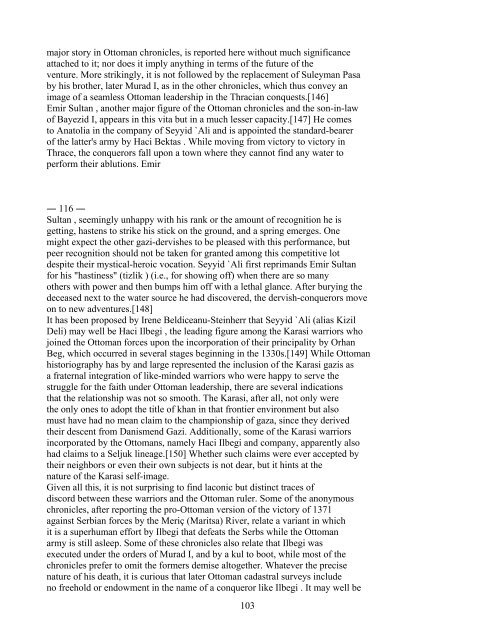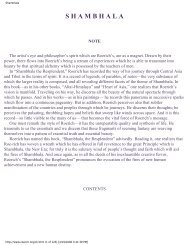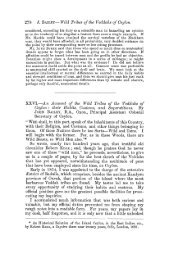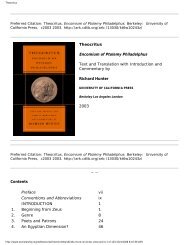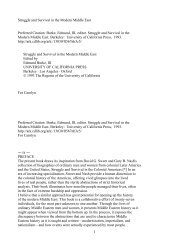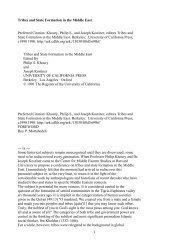Between Two Worlds Kafadar.pdf
Between Two Worlds Kafadar.pdf
Between Two Worlds Kafadar.pdf
Create successful ePaper yourself
Turn your PDF publications into a flip-book with our unique Google optimized e-Paper software.
major story in Ottoman chronicles, is reported here without much significance<br />
attached to it; nor does it imply anything in terms of the future of the<br />
venture. More strikingly, it is not followed by the replacement of Suleyman Pasa<br />
by his brother, later Murad I, as in the other chronicles, which thus convey an<br />
image of a seamless Ottoman leadership in the Thracian conquests.[146]<br />
Emir Sultan , another major figure of the Ottoman chronicles and the son-in-law<br />
of Bayezid I, appears in this vita but in a much lesser capacity.[147] He comes<br />
to Anatolia in the company of Seyyid `Ali and is appointed the standard-bearer<br />
of the latter's army by Haci Bektas . While moving from victory to victory in<br />
Thrace, the conquerors fall upon a town where they cannot find any water to<br />
perform their ablutions. Emir<br />
― 116 ―<br />
Sultan , seemingly unhappy with his rank or the amount of recognition he is<br />
getting, hastens to strike his stick on the ground, and a spring emerges. One<br />
might expect the other gazi-dervishes to be pleased with this performance, but<br />
peer recognition should not be taken for granted among this competitive lot<br />
despite their mystical-heroic vocation. Seyyid `Ali first reprimands Emir Sultan<br />
for his "hastiness" (tizlik ) (i.e., for showing off) when there are so many<br />
others with power and then bumps him off with a lethal glance. After burying the<br />
deceased next to the water source he had discovered, the dervish-conquerors move<br />
on to new adventures.[148]<br />
It has been proposed by Irene Beldiceanu-Steinherr that Seyyid `Ali (alias Kizil<br />
Deli) may well be Haci Ilbegi , the leading figure among the Karasi warriors who<br />
joined the Ottoman forces upon the incorporation of their principality by Orhan<br />
Beg, which occurred in several stages beginning in the 1330s.[149] While Ottoman<br />
historiography has by and large represented the inclusion of the Karasi gazis as<br />
a fraternal integration of like-minded warriors who were happy to serve the<br />
struggle for the faith under Ottoman leadership, there are several indications<br />
that the relationship was not so smooth. The Karasi, after all, not only were<br />
the only ones to adopt the title of khan in that frontier environment but also<br />
must have had no mean claim to the championship of gaza, since they derived<br />
their descent from Danismend Gazi. Additionally, some of the Karasi warriors<br />
incorporated by the Ottomans, namely Haci Ilbegi and company, apparently also<br />
had claims to a Seljuk lineage.[150] Whether such claims were ever accepted by<br />
their neighbors or even their own subjects is not dear, but it hints at the<br />
nature of the Karasi self-image.<br />
Given all this, it is not surprising to find laconic but distinct traces of<br />
discord between these warriors and the Ottoman ruler. Some of the anonymous<br />
chronicles, after reporting the pro-Ottoman version of the victory of 1371<br />
against Serbian forces by the Meriç (Maritsa) River, relate a variant in which<br />
it is a superhuman effort by Ilbegi that defeats the Serbs while the Ottoman<br />
army is still asleep. Some of these chronicles also relate that Ilbegi was<br />
executed under the orders of Murad I, and by a kul to boot, while most of the<br />
chronicles prefer to omit the formers demise altogether. Whatever the precise<br />
nature of his death, it is curious that later Ottoman cadastral surveys include<br />
no freehold or endowment in the name of a conqueror like Ilbegi . It may well be<br />
103


